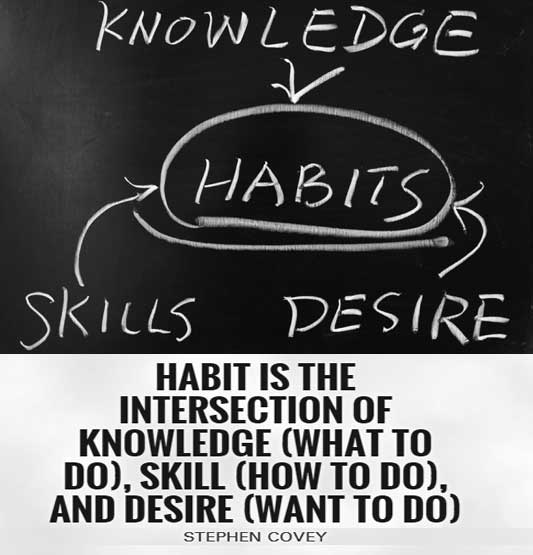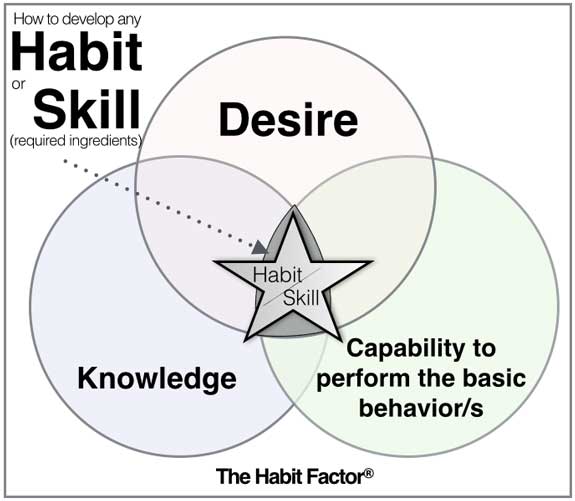
By: Martin Grunburg
In the last post we covered Dr. Stephen Covey’s classic three circle diagram (above), which was designed to help people understand the required ingredients for habit development: Knowledge, Skill and Desire.
Upon further analysis of these elements, however, “skill” in particular should be moved from its current “requirements” location (circle) and placed in the center circle — right next to habit.
Since experts in behavioral psychology have such a hard time distinguishing between habit and skill, the two ought to be considered twins (just not identical). Given that, the idea/suggestion that “skill” is a requirement for habit development becomes problematic, if not just plain confusing.
Both habit and skill require tens to hundreds of hours of practice to be developed, and not coincidentally both reside in the “older” parts of the brain, the limbic and cerebellum regions.
Therefore, the new diagram depicting the “requirements” for habit development should look more like this:

Why you should care…
First, both habit and skill are essential to help anyone achieve their goals. You do want to achieve your goals, don’t you? Secondly, when you understand how to develop one (skill, for instance), it will help you to better understand what it’s going to take to develop the other (habit, for instance). ; )
Since there is so much misinformation and so many regurgitated “myths” about habit development throughout the internet, the more we can closely associate habit and skill, the less likely people are to be confused about each — and we can help eliminate these ridiculous myths!
The following are just three prevalent myths perpetuated throughout the internet by some very notable “magazines” and productivity blogs — no names.
To make this exercise easier, we’ll simply substitute the word “skill” for the word habit (remember, they reside in the same place), and you’ll quickly see how ridiculous these three ideas for habit development really are.
1) It takes 21, 30, 66 days to develop a habit SKILL
Imagine being assured that you could play piano like a pro in just 21 days! Well the same goes for habit development. You aren’t likely to develop the habit in 21 days or even 66, but you are likely to begin to develop the habit.
2) You need to perform the habit SKILL every day, otherwise you’ll have to start over… “Don’t break the chain”
Don’t break that chain. Don’t break the chain. It’s a bit crazy to think people believe that they need to “start over” if they miss a day. The Habit Factor introduced the idea of “target” days for this very reason to help people recognize that “every day” is not a requirement for habit development.
3) You’ll need a reward to develop a habit SKILL.
Think about it…did your mom or your dad shove cake down your throat to help you learn how to ride a bike or after you learned how to drive a car? I’m guessing the answer is no, and when it comes to habit development a “reward” is not a requirement either.
So, there you have it. By redressing the former “requirements” from the habit development formula/diagram, we’ve identified a way to really test any and all new theories presented related to habit development. And, at the same time we’ve helped to destroy a few myths in the process. Yay. ; )
Until next time,
~mg